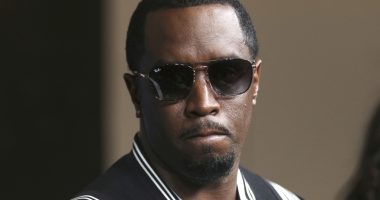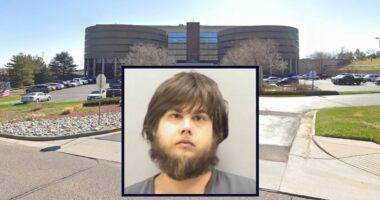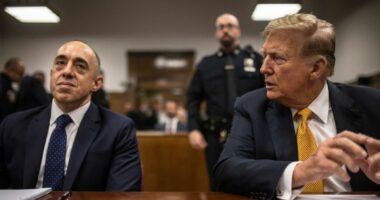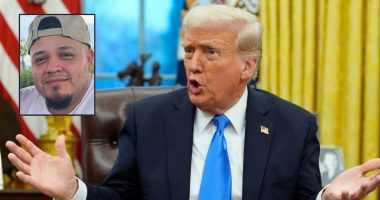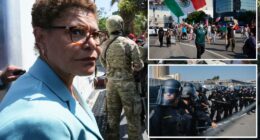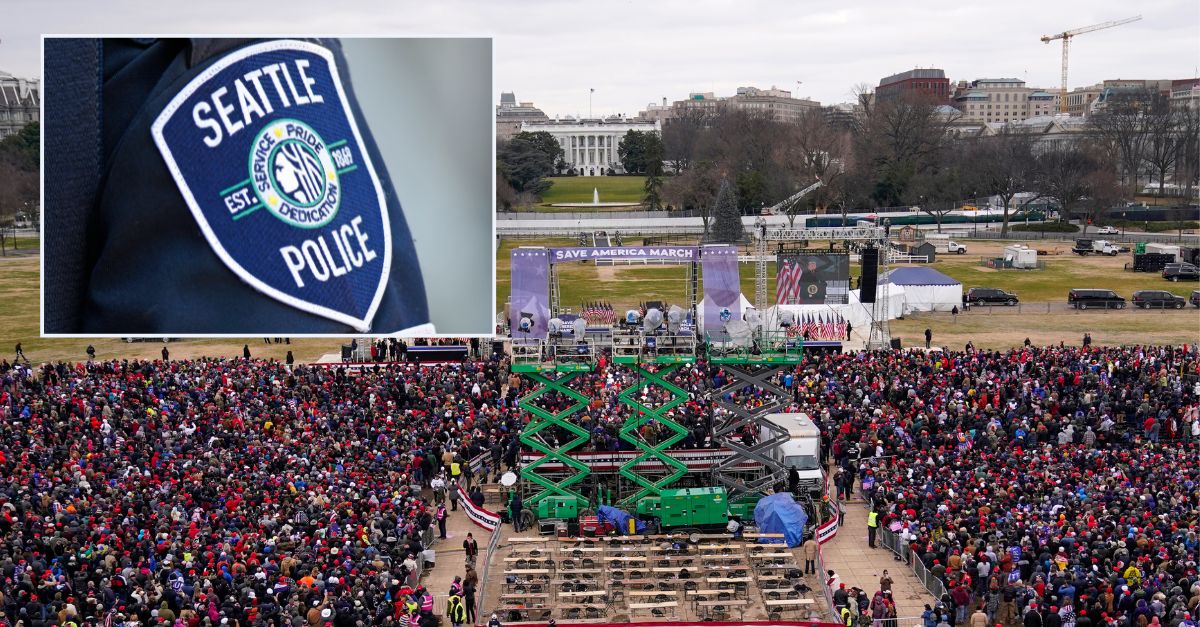
Background: President Donald Trump speaks during a rally Jan. 6, 2021, in Washington, on the Ellipse near the White House. (AP Photo/Evan Vucci, File)/Inset: A Seattle Police Department patch is seen on an officer’s uniform, July 17, 2016, in Seattle. (AP Photo/Ted S. Warren, File).
A group of police officers who attended the “Stop the Steal” rally on Jan. 6, 2021 — where Donald Trump spoke ahead of the U.S. Capitol attack and told attendees, “If you don’t fight like hell, you’re not going to have a country anymore” — have called on the nation’s highest court to help keep their names and conduct that day under wraps, saying it “constitutes harassment” and violates their First Amendment “right to privacy” if the info comes out.
“Applicants merely attended a public rally amongst thousands of attendees,” the group’s attorneys write in a U.S. Supreme Court petition, which comes after the law enforcement officers — made up of current and former cops — were handed a defeat by the Washington State Supreme Court in February over the same issue.
In their ruling, the Washington justices came to the conclusion that the individuals who are suing the Seattle Police Department on whether their names and conduct should be revealed by SPD officials should not be afforded anonymity. Their identities, the justices said, should be released following the completion of the SPD’s investigation into whether any cops attended both the Jan. 6 attack that day and acted violently.
The plaintiffs, who are identified by their lawyers using “John Doe” pseudonyms, claim it’s a violation of their First Amendment right to privacy to have the department release the results of its investigation. Investigators at the Office of Police Accountability (OPA) determined in a final report that three of the officers did not violate department policy, while the fourth’s conduct was deemed inconclusive.
After being notified of a number of public records requests targeting their attendance at the Jan. 6 rally, the group brought its suit against the City of Seattle and SPD, seeking declaratory and injunctive relief to prohibit the “public disclosure of unredacted investigatory records,” per their Supreme Court petition.
“These records include, among other records, transcripts of interviews in which the applicants were compelled to participate, under threat of termination, and were required to disclose their political beliefs, affiliations, reasons for attending the Rally, and their mental impressions as to the content of the Rally,” the group says.
“At its core, this appeal involves whether a government agency can ignore the chilling effect resulting from an employer requiring an employee to disclose their off-duty political activities and attendant impressions or motivations associated therewith,” they explain in the petition. “Followed by widespread dissemination to those who deliberately seek this information to subject these public servants to vilification without the commission of any misconduct whatsoever.”
All of the cops have maintained that they were not part of any wrongdoing or criminal behavior on Jan. 6 and that they were each exercising their First Amendment rights. They have argued that the exposure of their identities publicly could result in various hardships including harassment and “doxing.”
Six officers were originally at the center of the Washington State Supreme Court case, two of whom were fired in August 2021 and identified publicly by Seattle Police as married former officers Caitlin Everett and Alexander Everett.
Records show that the Seattle Police Department (SPD), did not learn about the Everetts’ presence at the Capitol or the others officers’ attendance of the “Stop the Steal” rally or other rallies that day until after someone in the group posted a photo of her on social media. The SPD police chief at the time, Adrian Diaz, ordered all officers to come forward if they were at the Capitol or attended any related events so they could present themselves for formal scrutiny by the OPA.
More from Law&Crime: ‘Literally in the middle of the night’: Justice Alito slams SCOTUS for issuing ‘unprecedented’ relief by stopping Trump deportations carried out under wartime law
The Everetts violated internal department policy because, as a disciplinary action report for Caitlin Everett states, the couple was in a restricted area at the U.S. Capitol as rioters were scaling the walls and local police scrambled to fend them off. Diaz resoundingly declared it “absurd” of the couple to suggest that the evidence OPA amassed did not show them trespassing directly in a zone where “they should not be amidst what was already a violent, criminal riot.”
“There was an active insurrection ongoing at the same time that you were in the immediate vicinity of the Capitol Building. This included rioters assaulting law enforcement officers and [rioters] making forced entries into the building,” disciplinary action reports for both Caitlin Everett and Alexander Everett stated.
Records show neither attended their disciplinary hearing before Diaz and both insisted their conduct was protected under the First Amendment. It does not appear that any criminal federal charges were ever filed against the couple.
“The core of this matter is that members of the greater Seattle Community do not believe that Applicants are entitled to a First Amendment right to attend a political rally while off duty,” the Supreme Court petition says. “The very purpose of this action is to expose Applicants and constitutes harassment itself.”
The current and former cops say the city of Seattle has also “publicly assailed” them with insults by “repeatedly claiming” that the rally that day before the Capitol attack was for fascists and white supremacists.
“They have attempted to paint guilt by association, wondering aloud on the purpose for Applicants’ attendance at the rally, obviously insinuating they are tied to right wing extremists,” the petition says, noting how national organizations like the National Lawyers Guild (NLG) and National Police Accountability Project (NPAP) have filed amici briefs with the Washington State Supreme Court “stating multiple falsehoods,” according to the group.
“These briefs, full of false and inflammatory allegations about the Applicants, are available to anyone who wishes to access them,” the petition says. “This alone is a reprisal as a result of lawfully exercising First Amendment rights.”
A response to the Supreme Court plea is due by Friday, April 25.
Love true crime? Sign up for our newsletter, The Law&Crime Docket, to get the latest real-life crime stories delivered right to your inbox.
Brandi Buchman contributed to this report.

